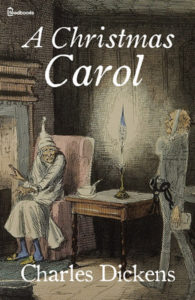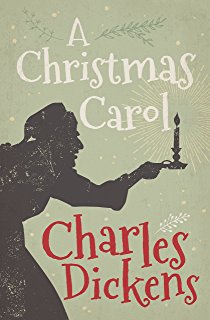The All-Time Great
The western world has been determinedly turning out pop-culture Christmas stories for a solid 150 years. There is the classic It’s A Wonderful Life, the overrated Frosty the Snowman, and the classically overrated Gift of the Magi. But the best of them all – possibly even the first of them all – is A Christmas Carol. Its greatness is made of many parts; I will here name five of them.
The characters. Ebenezer Scrooge is immortal. Dickens sketches his portrait in sharp, strong strokes – the covetous old sinner – and embellishes it with detail and variegated colors. He’s triumphantly awful in the beginning, in an entertaining sort of way; his sympathetic side emerges as soon as the spirits do, because it is rather gaming of Scroo ge to debate the ghost of Jacob Marley over whether it actually exists, and you must admire anyone who responds to a haunting with personal insults (“There is more of gravy than of the grave about you!”). The rest of the story effectively shows his souring and then his softening.
ge to debate the ghost of Jacob Marley over whether it actually exists, and you must admire anyone who responds to a haunting with personal insults (“There is more of gravy than of the grave about you!”). The rest of the story effectively shows his souring and then his softening.
Other characters occupy their own territory in civilizational memory. Jacob Marley and the Ghost of Christmas Future are chillingly evocative, and if Bob Cratchitt and Tiny Tim live under the accusation of being saccharine, they still live.
The writing. There are excellent film versions of A Christmas Carol, by which I primarily mean the one with George C. Scott. But the narrative and description of the written story are a delight that cannot be replicated in any movie. Dickens’ story breathes with color, wit, and feeling; he could – and did – describe an apple and give it character. If you can read Marley or the Ghost of Christmas Future without your blood being a little chilled, you were cold-blooded to begin with. If you can read his descriptions of food without getting hungry, you’re not even alive.
The supernatural character of the story. Technically, only Marley was a ghost. The other three were spirits. Still, the Ghost of Christmas Future is as harrowing an apparition as old Marley. A Christmas Carol is captivating in part because it seamlessly weaves Christmas story with ghost story, sentiment with horror. The story aims for the heart. It makes no qualms about playing on the nerves as well. A Christmas Carol creates, for its stage, a nexus of the spirit world and the world as humanity has made it – and it is unforgettable.
The sentiment. A Christmas Carol beats with sentiment – richly, warmly human sentiment. It ranges without shame from lunges at primal human sympathies to refined elocution. Tiny Tim is the height of the first; the second is scattered throughout the text, one of my favorite examples being the Ghost’s rebuke to Scrooge’s dismissal of the poor as surplus population: “Oh God! to hear the Insect on the leaf pronouncing on the too much life among his hungry brothers in the dust!”
To be fair to Dickens, his sentiment was not entirely without a sterner note. Marley strikingly refused Scrooge’s plea for comfort: “I have none to give. It comes from other regions, Ebenezer Scrooge, and is conveyed by other ministers, to other kinds of men.”
Which is the sort of thing that really lets you know where you are in life.
The joy. I’ve written before how Scrooge’s cold heart is manifested in his joyless life, and his return to human sympathies is a return to fun. Scrooge is recalled to charity; he is also recalled to joy. One of the charms of A Christmas Carol is how innocently and wholeheartedly it rejoices in the material pleasures of Christmas. There is nothing ascetic or gloomy about its view. The story makes no difference between goodness and happiness, between high sentiment and simple pleasure. They flow simply, naturally together – and that is wonderfully attractive.






























I’m sorry to disagree, but in the classic sense, It’s a Wonderful Life is a much better story. The Muppet Christmas Carol can rank equal to It’s a Wonderful Life, but not A Christmas Carol.
In the story Charles Dickens wrote, the ghosts come with pompous condemnation. One could argue that the only reason Scrooge changed was out of fear from the death described to him by the last ghost.
None of the versions, book or film outside of The Muppet Christmas Carol, is marked by love, a compassion in the spirits and their warnings. When comparing that to the story of Jesus, and how He came, it falls terribly flat. Terribly.
I will watch The Muppet Christmas Carol every year, sometimes four times in December, but Charles Dickens can go away. Thanks for reading.
I wholeheartedly second the motion of “The Muppet Christmas Carol” as a telling of the compassion and love that can change a heart. It’s goofy enough to enjoy on every level, but leaves you with that sense of “yes, joy wins” sense. It’s on our family tradition list as well.
Muppet Christmas Carol for the WIN!
I’d also add Inventing Christmas, I think that’s the title, which is the (fanciful and probably mostly fictional) story of how Dickens wrote A Christmas Carol. It’s a great insight into a writer’s mind, and also a fun way to see how Dickens changes as he writes the story.
I have always enjoyed that Dickens chose the first name Ebenezer, since it means, “thus far has the LORD helped me”. His name itself speaks of the moment when his life changes and turns.